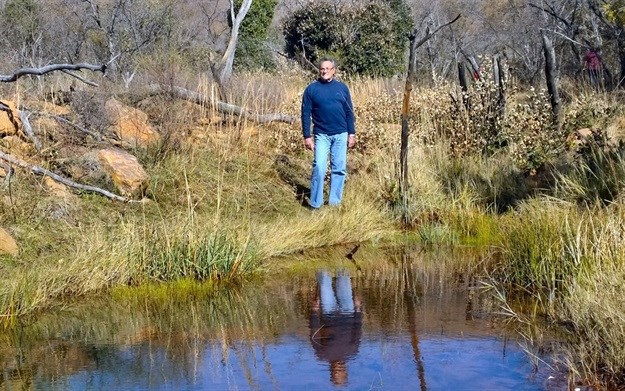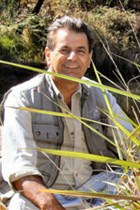A predictable counter-trend is a deep desire for urbanites to return to untouched nature. This ranges from weekends in the bush to an outright purchase of their own piece of untamed Africa, to claim a radically new lifestyle.
![[Earth Focus] Walk on the wild side: thoughts around a campfire](https://biz-file.com/c/1510/314563.jpg)
A century ago, our planet carried approximately half as many people as it carries today; large urban complexes were few and far between. Life in the wild was abundant, and it was relatively easy to re-enter the natural, primitive environment to recharge oneself. Today we experience the natural world through digital media such as TV or the internet, which explains the popularity of nature and wildlife documentaries. Yet the screen is a far cry from experiencing at first hand the symphonic silence of the African bush, crackling with life, and observing diverse animals roaming and surviving as existence designed them to do.
In a recent survey by the Swiss-based World Conservation Union, Chief Scientist Jeffrey McNeely wrote:
It is no coincidence that as the world's population has doubled over the past 40 years, the area of wildlife habitat given legal protection has almost tripled, and now amounts to nearly 12% of the land surface of our planet. Many, if not most of these protected areas are designed especially to appeal to tourists, both domestic and foreign. Indeed, a convincing argument can be made that wildlife tourism and ranching has been an essential stimulus for encouraging governments to take the measures necessary for conserving the world's biodiversity.It's therefore not surprising that a growing number of 21st century inhabitants are prepared to invest in a return to nature, and reconnect with the world's remaining wild areas.
![[Earth Focus] Walk on the wild side: thoughts around a campfire](https://biz-file.com/c/1510/314564.jpg)
This return to nature is at best driven by a deep need for reconnection with the earth, rewarding us with a sense of well-being and peace we have lost in our fast, noisy cities. Experiencing nature can take various forms including ecotourism, wildlife tourism, wildlife ranching or nature conservation; yet an increasing number of people are claiming their stake and living deep in the bush as a lifestyle choice. South Africa certainly has enough untouched spaces for unique 'Out of Africa' experiences.
According to a 2006 report by the National Agricultural Marketing Council, about 23% of the total land in South Africa is under various levels of conservation management. Most of this is privately owned, and thankfully well-managed.
This might explain the growing trend to protect and manage wildlife areas where business, leisure and conservation operate in a mutually supportive, self-sustaining energy loop. This requires a new breed of holistic managers, those who understand that everything is connected to literally everything.
This is the concept behind integrated wildlife management.
Once this is understood, elements such as profit fall into the natural order of things. Balance is what life on earth is all about. Imbalance simply leads to degradation, suffering and system collapse. In a word, unsustainable.
![[Earth Focus] Walk on the wild side: thoughts around a campfire](https://biz-file.com/c/1510/314566.jpg)
Making a fair profit in an environmentally compliant way is good not only for one's conscience but also for one's pocket. In SA, the game ranching industry is worth around R2bn every year and is growing 10% per annum according to the Barclay Africa Group. One fine kudu bull recently sold for R9.4m, a price ranchers seem happy to pay for good breeding and blood genetics.
An environmentally compliant, luxury bush getaway has to run efficiently to be sustainable, and this positively influences the business side of the operation.
A fine example of a 21st century bush operation is Dinkweng Safari Camp, lost in the fathomless silence of South Africa's northwest bushveld, two and a half hours from OR Tambo International Airport.
Dinkweng means 'place of the leopard' in the local dialect, and these magnificent cats still roam wild in the area.
Behind every great enterprise lies a vision, as attested by owner and founder Mac van der Merwe.
Driven by his love for the bush, this engineer, conservationist and new age entrepreneur has managed to achieve that rare balance in which animal conservation, wildlife ranching, luxury living and modern technology are mutually supportive.
The sustainable set-up comprises nine luxury, self-catering, three-bedroomed thatched lodges, each with its deck, a circular bonfire area and sparkling pool. As the lodges overlook vast valleys, the sense of space and the depth of silence is intoxicating; the views of moonrises or sunsets are breathtaking. The built environment also includes a communal area featuring an admin centre, a comfortable lounge with large fireplace and adjoining pub, kitchen, conference centre, boma and bonfire area.

Operating as a high-tech operation in the silent hills of the Limpopo bush, this safari camp has been designed to accommodate everything from corporate events to natural family living, with minimal disturbance to the wildlife and the environment.
The secret to its sustainability is that human activities such as hiking or mountain biking, blend seamlessly into the bush environment; a win-win for all participants.
Owner Mac has erected carefully designed fences to prevent predators from unnaturally decimating his wildlife. He has already transferred additional wildlife into his nearly one thousand hectares. These have been selected to co-exist and breed amongst themselves.
Game currently consists of ungulates or hoofed animals, giraffe, zebra, wildebeest and soon rhinoceros. Mac is planning a separate camp for these endangered animals. His plan is clear, "They will be free to roam in six hectares of natural vegetation, an area large enough to permit free movement, yet small enough to offer optimum monitoring and protection against poachers. The larger the area, the more difficult it is to control."
This is a bold move in terms of conserving a threatened species, but Mac feels more than confident that he will be able to manage the process to the benefit of all. This includes the local community, the wildlife, the leisure industry, the natural bush and the environment in general.
![[Earth Focus] Walk on the wild side: thoughts around a campfire](https://biz-file.com/c/1510/314567.jpg)
His longer term plan is to replenish other African states with quality wildlife. This will hopefully boost tourism and generate revenue, vital for many states who see the value of conserving and sustaining wildlife.
Having no predators, the camp's recreational activities include hiking and mountain biking on well-designed trails, swimming, game drives and bush picnics by mountain streams. If necessary, wi-fi is available in the communal area and DSTV is available in the sumptuous three-bedroomed lodges. These feature luxury fittings, and impart an uplifting sense of spaciousness that accompanies high thatched roofs and quality furnishings.
Given today's alternative energy technology, Eskom is no longer essential to quality living in remote areas. Provided one has access to pure water and natural energy sources such as solar and wind, a highly satisfying, world-class yet affordable lifestyle is attainable.
Being an engineer, Mac uses the latest technology to sustain a constant flow of pure water, using renewable energy where appropriate. A new innovation is his camera-equipped drone to monitor the game. This high flying, silent drone has a camera that can pan, tilt and zoom. It also has infra-red capability for night monitoring, turning it into a powerful eye in the sky. The infrared camera not only tracks the movement of wildlife during the night, but can also spot intruders. Feeding signals back to a base screen, the drone can pinpoint any poachers from a high altitude, thus optimising management and security.
This is where ecology and technology meet on mutually respectful ground.
![[Earth Focus] Walk on the wild side: thoughts around a campfire](https://biz-file.com/c/1510/314568.jpg)
Infrastructure and technology include four wheel drive vehicles, effective fencing, renewable energy, and well-maintained roads where guests, visitors or residents become part of a sustainable ecosphere. This is quality living at its best, close to the primitive, pristine and pure heart of Africa.
According to Mac, humans have disturbed the balance of nature to such an extent that wildlife, if now left to itself, may not be able to sustain itself; this means that natural areas have to be proactively managed if there is any hope of survival. This is where ecotourism, leisure and conservation can work together synergistically, where even the local community benefits.
Living well in the bush can be done and the lifestyle already works well for many. While there is a cost involved, the real investment lies in a radical redefinition of 'quality of life' which includes a healthy profit.
![[Earth Focus] Walk on the wild side: thoughts around a campfire](https://biz-file.com/c/1510/314569.jpg)
Much of today's existential angst can been attributed to disconnection from the planet and the diverse forms of life of which we are an inextricable part.
Intrepid travellers that we are, many of us seek a reconnection with nature, the cosmos and ultimately with ourselves. Wild, untouched places in South Africa offer tantalising, rare opportunities for alternative lifestyles. When moving deep into the bush, away from urban living, we return to a reality similar to our primeval ancestors. We reconnect with our natural state, observing, sensing, listening, smelling, dreaming, doing and thinking.
Survival, quality of life and existence take on new meaning. Could this be what makes life worth living? The answer might yet lie in the soil from which we purportedly arose.
